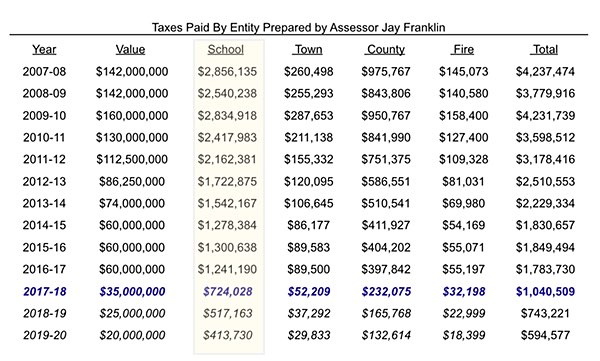- By Dan Veaner
- News
 Print
Print 
Lansing School Superintendent Chris Pettograsso shared what information she had Monday when a school district resident asked what the impact of the plant's devaluation and a possible repowering with natural gas will mean in terms of how it impacts the schools. She asked the school board specifically how a plan to deliver Compressed Natural Gas (CNG) between using 25 to 60 trucks per day would impact safety as the trucks drive past the school campus, and also how the devaluation or possible closing of the plant would impact taxes and school programs.
"We can talk about what we know, because we're often, too, trying to get information," Pettograsso said. "We have somewhat regular meetings with the plant to gather some input, and often they'll ask for our input."
The repowering plan was announced last June, and plans are still in motion to construct an 18 megawatt, 75 acre solar farm on the power plant's 434-acre site in northwest Lansing, making it one of the largest solar farms in upstate New York.
An earlier repowering plan called for the construction of a gas pipeline that was widely opposed and denied by the Public Service Commission (PSC). The new plan calls for shutting down a 155 megawatt coal-fired burner in order to repower it with natural gas. Company officials say Compressed Natural Gas (CNG) will be conveyed to the plant by truck, eliminating the need for a gas pipeline. If approved, the conversion would not be paid for at ratepayers' expense. Plant officials have said their data predicts the 25 to 60 trucks per day would only add 2% to traffic along the route.
Pettograsso said power plant officials approached school officials about a year ago to talk about the plan to truck in CNG. She says district administrators told plant officials they are concerned about traffic on Ridge Road, especially during peak traffic hours when children are coming and going home from school. Another concern was how noise from the trucks would impact classes in buildings that are close to the road. She said district administrators don't have any information about the safety of the trucks.
The impact of the devaluation of the plant and, in the worst case, entirely closing it would not be catastrophic according to Pettograsso.
 This chart, prepared by Tompkins County Assessment Office Director Jay Franklin and presented at a school budget hearing May 8, 2017, shows the PILOT (Payment In Lieu Of Taxes) value of the Cayuga Power Plant during the years its value has been agreed upon in PILOT agreements. A $140 million reduction in a dozen years has meant millions of dollars in lost revenue for affected taxing authorities. According to the current PILOT the plant loses another $5 million in value this year.
This chart, prepared by Tompkins County Assessment Office Director Jay Franklin and presented at a school budget hearing May 8, 2017, shows the PILOT (Payment In Lieu Of Taxes) value of the Cayuga Power Plant during the years its value has been agreed upon in PILOT agreements. A $140 million reduction in a dozen years has meant millions of dollars in lost revenue for affected taxing authorities. According to the current PILOT the plant loses another $5 million in value this year. While the Town of Lansing, Tompkins County, the Lansing Fire District also receive revenue from the power plant PILOT, the biggest loser is the Lansing Central School District. School district revenues from the plant went down from $2.8 million in the 2007-08 school year to an estimated $413,730 this summer.
"We're always trying to say, if the plant did close what would the value be?" Pettograsso said. "We don't have a definite number. There would still be some value to it if it were to be closed, because it's property and land. But at this point I don't think it would be catastrophic. We would have to make some decisions about our programming. But we've been planning on that in case it does happen. We're hopeful it doesn't."
School Business Administrator Kate Heath said that conversations with plant officials continue.
"We don't know for sure what's going to happen either, so we have to get as much information as we can," she said.
But Pettograsso had some encouraging news. New development in the Town of Lansing is increasing the tax base, thus filling in some of the lost value of the plant. Careful monitoring of the situation, budget cuts, and under-spending of budgets helped the district weather the worst of that storm, which resulted in the loss of millions of dollars in revenue from the plant, which had to be made up for by homeowners and other property taxpayers within school district borders.
"We're not going to go under," she said. "We're still going to have our amazing programs that we have. That will still continue. We're going to have to make some tough decisions, of course, but it's not something we feel really dire about."
v15i12



